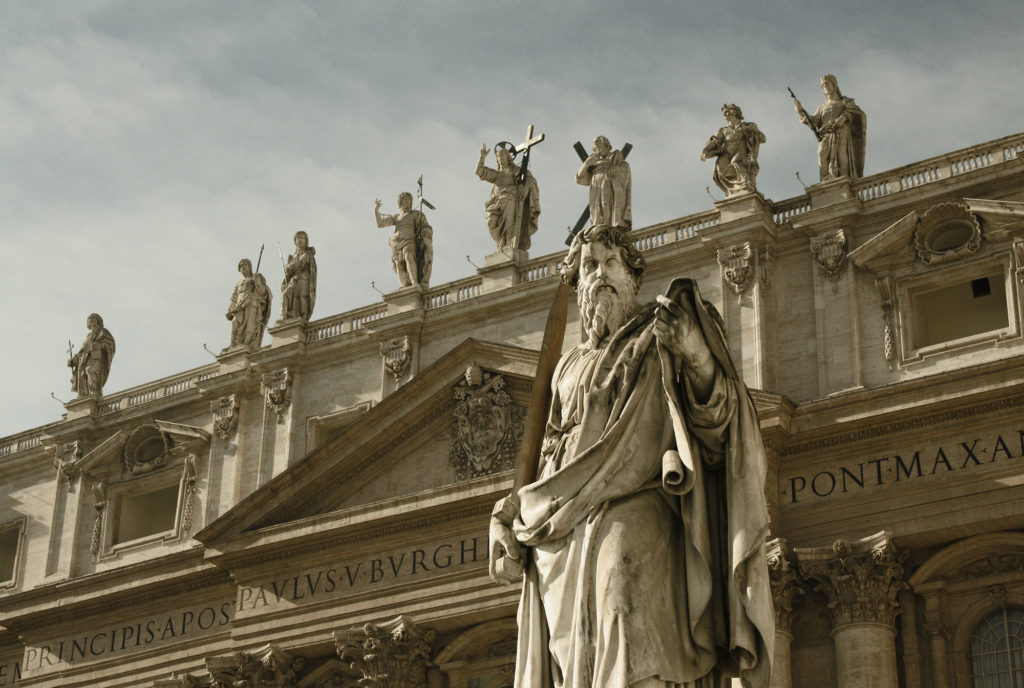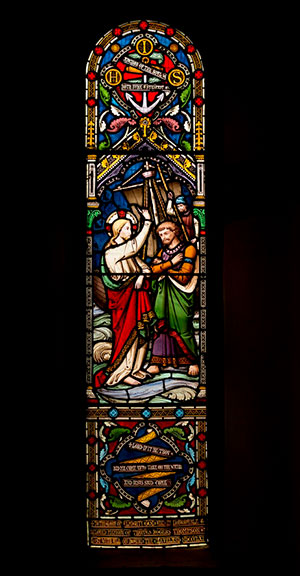Jesus Lived
Jesus was one of us. There is no question that Jesus lived. A scholar friend of mine put it this way: we know he died, therefore, we know he lived. The fact that Jesus of Nazareth was a real person is good news indeed. He saw possibilities in a time of war, oppression, exploitation, suffering, imperial rule. We can too.
Jesus’s Divinity
Jesus’s divinity has long been a claim of the Christian tradition. The worldview of his time included a hierarchy of being with God at the top and earthly kings just a tad lower. Jesus’s world was defined by language of kingdoms and imperial authority. Caesar claimed the imprimatur of God and used titles such as Lord, Savior, Son of God, Bringer of Peace, Messiah. The early Christian community assigned those titles to Jesus as well. A way of proclaiming a rival kingship, a rival Lordship, a rival kingdom. For his followers, Jesus was Lord, not Caesar. And Jesus offered a vision of world that was in sharp contrast to the world of the imperial ruling authorities.
A world with a different understanding of God with us.
The confessional language of early Christian communities insisted on Jesus’s divinity as well as his humanity as testimony that Jesus was far greater than any king on earth could be and that his vision was paramount. By the fourth century Christianity was declared the religion of the now Holy Roman Empire. That is not to say that Empire became “the kingdom of God” or hastened it. The attempt to wed Empire and Christianity has been fraught from the beginning.
Jesus’s vision as a human being
I think Jesus’s vision and hope for the world is paramount as well. But not because he was divine. But because he was a human being with capacity for compassion, humility, courage, daring, justice, love, creativity, imagination, pluck, wisdom.
Jesus was a teacher of wisdom. He changed the way people saw themselves and each other. His very presence seemed to jostle awake those near to him and even those far off. Jesus had a way of quickening the realization that this life is privilege, and the possibilities are endless and what matters is here and now. Jesus trusted. And for all life’s ambiguities and harsh realities, it is indeed one of joy.
A visionary of human possibility
My hope is that Jesus was like us. And therefore, we can be like him and be for our time what he was for his. A visionary of human possibility. He made the world a better place and insists that we can too.
The historical Jesus holds great hope for us. I love this quote of Albert Schweitzer from his seminal work on Jesus. Schweitzer may have been wrong about Jesus being apocalyptic. But this quote holds for me the ring of truth that continues to this day:
He comes to us as One unknown, without a name, as of old, by the lake-side; He came to those who knew Him not. He speaks to us the same word: ‘Follow thou me!’ and sets us to the tasks which He has to fulfill for our time. He commands. And to those who obey Him, whether they be wise or simple, He will reveal Himself in the toils, the conflicts, the sufferings which they shall pass through in His fellowship, and, as an ineffable mystery, they shall learn in their own experience Who He is.
– The Quest of the Historical Jesus (New York: MacMillan, 1956), p. 403
Under “Articles and Posts” is a recent sermon by Marianne Borg given on the feast day of Christ the King which weaves elements of the above conversation.





Emphasizing Jesus humanity makes orthodox language complicated. Jesus’ status as both “human and divine” implies a condition of equality. My Lutheran background did not provided a clear way to deal with that kind of equality, so divinity was my default position.
Understanding Jesus’ humanity, fundamentally knowing him as “one of us,” tempered that position without disrespecting the historic importance of divinity. When I put myself in the hearts and minds of people oppressed by Roman rule, and the rascals in the temple, I can see myself responding to The Way of Jesus. Rome declared Caesar divine before Jesus was born. Would it have occurred to His followers to honor Him with that distinction had Caesar not appropriated the title? I believe Jesus’ community first recognized his humanity before honoring him with “divinity,” which challenged Caesar and changed the world.
Ken. As you well know the two natures of Jesus divine and human have been a mainstay of the creeds. Wonderment about “the gods” has been part of the play of the human psyche from the beginning it seems. “God” represents what we value. And maybe what we fear. And more. I do not have a classical education, others can shed light on this. For me Jesus is an embodiment of what we value as human beings, a way of being and being in relationship with what is seen and unseen. And in that Jesus is God with us. For us Christians Jesus is definitive. And there are other embodiments too. Jesus is ever calling me to trust. And not to be afraid.
Thank you, Marianne. I am looking forward to Ring Lake Ranch and your leadership this summer. I cannot find words to express how much the books, articles, travels, lectures and conversations with you and Marcus have meant to me. Your work with the Marcus J. Borg Foundation is deeply appreciated.
Sue, Wonderful to hear from you and look forward to being with with you at Ring Lake Ranch. Seeing your face and receiving your message brought back many memories of shared experiences we have had. And this summer will become another. Thanks for the support. Look forward to our conversations.
A teacher at Pendle Hill said you really couldn’t get a grip on The Guy with a low Christology; you’d need to combine that with a high anthropology. That is, You can truly say ‘He was only a man,’ but you have to add that ‘Human beings are divine.’
“Of myself, I can do nothing” — that’s what the human condition looks like when you realize that ‘you’ and your doings are a limited subset of God and God’s activities.
So far as you can stop being proud or ashamed of who you are and what you can do — have given up trying to be the star of this show — you find God doing remarkable things, both with you and without you. That was the context of his courage, wisdom, and proximity to miracle…
Forrest. “Only a man.” What concerns me: the tendency to “divinize” our positive attributes or accomplishments. Without God I can do nothing. I am a mere mortal. Can there be a way of acknowledging our limit and limitation without assuming a human/divine split? A long and dark shadow is cast when we create a hierarchy of being with God at the top and us quite a bit lower. I should ask, What do you mean by our doings (good ones I presume ) are a subset of God’s? I may have missed a point. I think human beings and what we can experience is truly remarkable. When wondrous things happen we wish to give thanks……to God??? That is a deep impulse. I suggest Gratitude is for us like unfurling for a flower. But does that necessitate a “divine human” split…must there be a duality? Perhaps you are including the struggle with ego that gets in our way. You give me lots to think about. Thanks for taking the time to continue the conversation. And it will continue.